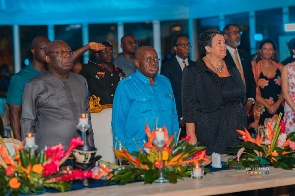 Akufo-Addo with some dignitaries at the event
Akufo-Addo with some dignitaries at the event
The President, Nana Addo Dankwa Akufo-Addo, has called on his fellow African leaders and actors in the nuclear industry to harness nuclear energy to help address Africa's developmental challenges.
“Together, let us work and strive to harness the power of nuclear energy to address Africa's energy challenges, promote sustainable development, and ensure a brighter future for generations to come.
The President made the call at the Gala Dinner of the first-ever U.S.-Africa Nuclear Energy Summit and the International Framework for Nuclear Energy Co-operation (IFNEC) Ministerial Conference in Accra last Wednesday night.
The dinner, organized by the Nuclear Power Institute of the Ghana Atomic Energy
commission in collaboration with the U.S. Department of Energy was attended by
ministers of energy from Africa and worldwide, policymakers, technical experts, and influencers on nuclear matters.
Having officially announced the inclusion of nuclear energy in Ghana’s electricity generation mix last year, the President indicated that Ghana’s energy transition plan envisages 30 percent of electricity production from nuclear energy by 2070.
“This strong commitment and position are geared towards clean and affordable electricity to drive our industrialization agenda. It is also to position Ghana as a net power exporter in the ECOWAS region through the West African Power Pool,” he added.
He also noted that Ghana was critically analyzing the innovations in small modular reactors (SMRs), and their potential for rapid deployment for clean and affordable energy.
“We are currently working with domestic and international experts to study the feasibility of deploying this new technology in Ghana,” he stated.
The president expressed gratitude to the US Government for the partnership in organizing the two ministerial events, and most especially for Ghana being the host of the first-ever Pan-African event focused on the future of nuclear power in Africa on the theme "Unlocking Africa's potential through Nuclear Energy".
He said the outcome of this summit must propel the deployment of nuclear technology for power production in Africa, as the application of this technology holds the potential to expand African economies and improve the lives of its people.
“We know nuclear power, with its low carbon footprint, can play a significant role in combating climate change. As African countries strive to meet their commitments, under the Paris Agreement, nuclear power offers a viable solution for reducing greenhouse gas emissions, whilst meeting the growing energy demands of our populations,” he stated.
He underscored the need for findings from the summit to be effectively disseminated to all and sundry for a better understanding of the enormous benefits of adopting nuclear technologies in transitioning to net zero and laying to rest unfounded, popular fears about the safety of nuclear technology.
On her part, the U.S. Ambassador to Ghana, Virginia E. Palmer reiterated the significant potential of nuclear power for the sustainable development of countries around the world.
She noted that it can drive the clean energy revolution, strengthen energy access and diversity of supply, and fuel industrial development in energy-intensive sectors. “Nuclear energy development demands committed partners. The United States is your 100-year nuclear energy partner,” she said.